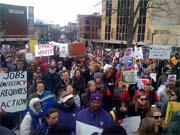News
The Word from Wisconsin: This is Not Over!

Tens of thousands of union members and sympathetic supporters’ of Wisconsin’s state and local government employees turned out over the weekend in Madison, the state capital, to protest the union-busting law jammed through the state legislature last week.Backed by the entire U.S. labor movement, their message was simple: “This fight is not over!”
The state’s Republican Party establishment violated the Wisconsin law on public meetings to use a parliamentary trick to overcome the Democrat’s boycott of the Senate, and the public’s overwhelming opposition, in order to pass a law that effectively strips the states’ public employees of their collective bargaining rights. “In a stroke of his pen,” AFL-CIO President Rich Trumka said, “Governor Walkers has wiped civil rights established 60 years ago – this will not stand!”
The new law prohibits unions from negotiating on any matter except wages, and even then limits wage increases to no greater than the rate of inflation. State and local government agencies would be free to set staffing levels, adjust hours and working conditions and alter pension and health care plans unilaterally, without any negotiations with their workers. The new law also prohibits public employers in Wisconsin from collecting dues through payroll deduction and requires unions to hold an annual vote on whether employees’ wish to continue to be represented by a union – and rigging these so-called recertification votes by requiring the support of “50% plus one” of all employees eligible to vote, not just those who choose to vote.
The all-out assault on workers’ rights prompted a three-week standoff when all 14 Democratic members of the state Senate withdrew to the neighboring state of Illinois to deny the Republican majority of a quorum to hold a vote on the proposal. The anti-union measure was included in a budget bill that required 20 senators to be present, one more than the 19 members of the GOP senate caucus.
Over three weeks massive street protests erupted, drawing support from all over America and all over the world. Indeed, a local Pizza maker (Ian’s Pizzeria) reported receiving orders for pizza to be sent to workers occupying the state capitol from dozens of countries across the globe. Weeks of debate shifted public opinion in favor of the workers as national and Wisconsin state polls showed that the public opposed the union-busting law by a 2-to-1 margin. Meanwhile, the approval rating of the corporate-backed governor of the state, Scott Walker, plummeted.
Despite the public’s opposition the GOP used subterfuge to win passage of the bill, pretending to negotiate over a compromise only to abruptly use a parliamentary maneuver to pass the bill while the Democrats were still in Illinois. The union-busting provision was separated from the budget bill and passed as a stand-alone measure (overcoming the quorum requirement).
“We have lost this battle, but we are winning the war of ideas and the voters of Wisconsin will reverse this decision at the ballot box,” the Wisconsin state AFL-CIO president commented. Indeed, the state’s labor unions are mobilizing right now to collect signatures to hold so-called “recall elections” for eight of the Republican senators who voted for the anti-union law. A recall election allows voters to replace sitting legislators before the next general election if 25% of voters sign petitions to hold a special election. Backed by the national Labor Unity Table made up of several AFL-CIO and Change to Win unions, thousands of union activists are already busy collecting signatures for the recall elections, which should be held in June or July. Also in the works for early 2012 is a recall election for Governor Walker, who must serve at least a year before he can be recalled.
The goal is to elect a state legislature and a Governor that will listen to the voters, respect the rights of the state’s workers, and repeal the union-stripping law.
The spirit of the unions in Wisconsin is undaunted. Many have already established means to collect union dues through electronic funds transfers from their members’ banks to overcome the loss of payroll deductions. Indeed, one state union predicted that its membership will be greater after the crisis than before it. “Scott Walker is the best union organizer we’ve ever had,” he remarked. And the fight in Wisconsin has inspired massive resistance in several other states facing similar battles, including the states of Ohio, Indiana, New Hampshire and Michigan. The resistance has already paid off in several states, including New Jersey and Pennsylvania, where governors have backed away from anti-union measures similar to those advanced in Wisconsin.
America’s unions will seek to make the state battles a platform for rebuilding a labor movement in the private sector as well. As UNI’s Philip Jennings noted “The fight in Wisconsin has reminded America’s workers why it’s important to have a strong labor movement; democracy and decent work depend on it.”

